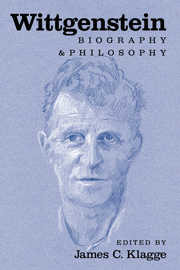Book contents
- Frontmatter
- Contents
- Contributors
- Editor's Preface
- Biography and Philosophy
- Wittgenstein
- Wittgenstein and the Mind's Eye
- Deep Disquietudes: Reflections on Wittgenstein as Antiphilosopher
- The Sleepy Philosopher: How to Read Wittgenstein's Diaries
- Letters from a Philosopher
- Wittgenstein and Reason
- Wittgenstein and the Idea of Jewishness
Letters from a Philosopher
Published online by Cambridge University Press: 27 March 2010
- Frontmatter
- Contents
- Contributors
- Editor's Preface
- Biography and Philosophy
- Wittgenstein
- Wittgenstein and the Mind's Eye
- Deep Disquietudes: Reflections on Wittgenstein as Antiphilosopher
- The Sleepy Philosopher: How to Read Wittgenstein's Diaries
- Letters from a Philosopher
- Wittgenstein and Reason
- Wittgenstein and the Idea of Jewishness
Summary
Why do we bother to occupy ourselves with a famous philosopher's life? As a life it is probably not especially interesting. More probably, it is rather boring – many hours of this life will have been spent working fairly hard and not always successfully. There may be family tragedies and love stories, acquisition of money and loss of money, but these are pretty general, even ubiquitous phenomena, nothing that helps us to understand this particular philosopher's writings. In the case of authors of the remote past, we may want to know more about the sociopolitical context in order to understand to what our philosopher was responding. In that case, however, what we require is information about the intellectual context in which he led his life, not about specific events of his private life.
Still, paying attention to a philosopher's more or less private relics by way of studying his correspondence may be helpful, especially in two respects. First, the correspondence may contain information about the genesis of the philosopher's work and may consequently shed light on questions of dating manuscripts and on what was (at a certain time) meant to replace what, what was regarded as superseded, and what a promising new start. This type of information may then be useful for judging the relative importance of some remarks as compared with others, and can thus help to decide questions of interpretation. A second type of information sometimes revealed by a philosopher's correspondence concerns questions of technique in writing his works.
- Type
- Chapter
- Information
- WittgensteinBiography and Philosophy, pp. 176 - 194Publisher: Cambridge University PressPrint publication year: 2001



